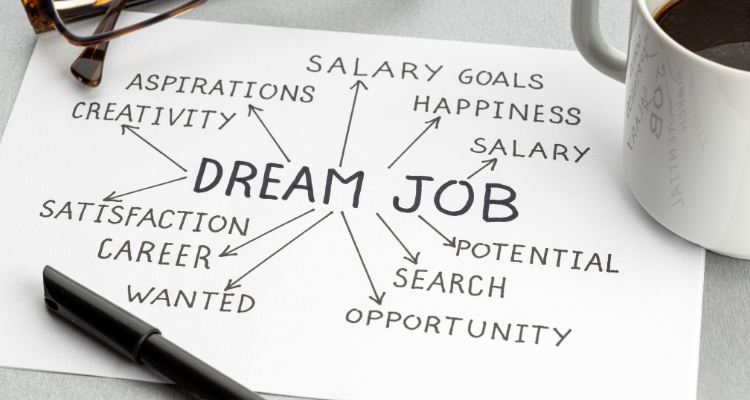You’ve probably heard the saying, “It’s not what you know, it’s who you know.” While skills and knowledge are important, connections can often be the key that unlocks doors in your career. That’s where informational interviews come in. They’re not just casual chats – they’re strategic conversations that can give you a leg up in your job search or career transition.
What Is An Informational Interview?
An informational interview is a purposeful conversation with someone working in a role, company, or industry you’re interested in. You’re not there to ask for a job – you’re there to learn, network, and get insights you can’t find on Google. Think of it as reconnaissance for your career.
Why Bother?
Informational interviews offer several benefits that can significantly impact your career journey:
- Get the inside scoop on jobs and industries: Job descriptions often sugarcoat or oversimplify roles. Talking to someone in the trenches gives you the real deal on day-to-day tasks, challenges, and culture.
- Uncover hidden opportunities: Many jobs (some say up to 80%) are never publicly posted. Building relationships through informational interviews might help you hear about these “hidden” jobs before anyone else.
- Assess career fit: If you’re unsure about a career path, these chats can help you figure out if a role or industry is really a good fit for you before you commit.
- Identify skill gaps: Learn what skills and experiences are truly valued in your target role or industry, so you can focus your learning and development efforts.
- Practice for job interviews: Informational interviews provide low-pressure practice for “real” job interviews, helping you get comfortable talking about your background and goals with professionals in your field.
How to Make It Happen (Without Being Awkward)
The first step is targeting the right people. Don’t just reach out to anyone with a fancy title. Look for people in roles one or two levels above where you want to be, recent hires at companies you’re interested in, alumni from your school working in your target industry, or second-degree connections on LinkedIn.
Once you’ve identified potential contacts, you need to craft a message that gets responses. Your outreach needs to be short, specific, and show you’ve done your homework. Here’s a template that works:
“Hi [Name],
I’m [Your Name], a [your current role/situation] with a background in [relevant experience]. I came across your profile while researching [specific company/role/industry] and I’m really impressed by [specific accomplishment or aspect of their career].
I’m exploring opportunities in [industry/role] and would love to get your perspective on [1-2 specific questions]. Would you be open to a 20-minute phone call or video chat at your convenience?
I know you’re busy, so no worries if you can’t. Either way, I appreciate your time.
Thanks,
[Your Name]”
Preparing for the Interview
Once you’ve got a meeting set up, it’s time to prepare. Research the person and their company thoroughly. Look for recent news, projects, or initiatives they might be involved in. Prepare 5-7 thoughtful questions, focusing on things you can’t easily find online. Have a clear, concise “elevator pitch” about yourself ready, and be prepared to talk about your career goals and how this conversation fits into your overall plan.
During the interview, start by thanking them and briefly introducing yourself. Ask if it’s okay to take notes. Remember, your goal is to listen more than you talk – you’re there to learn from them. If the conversation is going well and they seem open to it, ask if they can suggest 1-2 other people you should talk to. End by asking, “Is there anything I can do to help you?” It might surprise them, and it shows you’re not just there to take.
Questions That Get Real Answers
Avoid generic questions. Instead, try asking about:
- A problem or challenge in their industry that they’re excited to solve.
- What would make a candidate stand out if they were hiring for an entry-level position in their department.
- How their role has changed since they started and what skills have become more important.
- Common misconceptions people have about their job or industry.
- What they would do differently if they could go back to the start of their career.
- Trends in their industry that they think are overhyped or underrated.
Follow-Up That Stands Out
After the interview, send a thank-you email within 24 hours, mentioning specific insights you found valuable. If they gave you advice or suggested resources, follow up in a few weeks to let them know how you used their suggestions. Connect on LinkedIn with a personalized message referencing your conversation. Every few months, send a quick update on your career progress. This keeps the relationship warm without being pushy.
Turning Insights into Action
After each interview, write down three key takeaways and one action step you can take based on what you learned. Keep a record of all your informational interviews, including key points discussed and any follow-up tasks. Look for patterns in the advice and insights you’re getting across multiple interviews.
Informational interviews are about playing the long game. You’re building relationships and gathering intelligence that will serve you throughout your career. It might feel awkward at first, but with practice, it becomes a powerful tool in your professional toolkit.
Have you tried informational interviewing?
What worked for you? What didn’t? Share your experiences in the comments – your insights could help someone else take that crucial first step!





